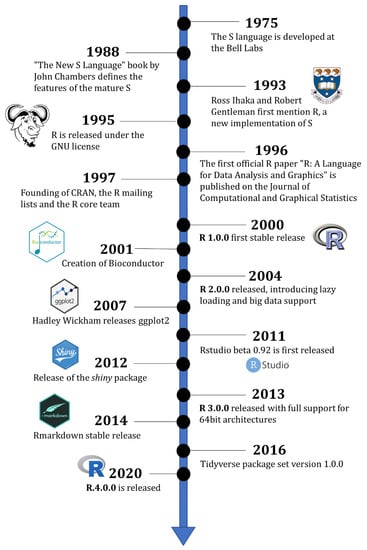The Best Guide To Bioinformatics Tutor
The Best Guide To Bioinformatics Tutor
Blog Article
The Buzz on Bioinformatics Tutor
Table of ContentsHow Bioinformatics Tutor can Save You Time, Stress, and Money.Indicators on Bioinformatics Tutor You Need To KnowA Biased View of Bioinformatics Tutor7 Easy Facts About Bioinformatics Tutor ShownThe Ultimate Guide To Bioinformatics Tutor
Of the total amount participants associated with the training, 80% were pupils from public college institutions, while the staying 20% came from personal institutions. To receive a certificate of participation, trainees were called for to go to a minimum of 90% of the complete training hours. As an outcome of this demand, an outstanding 95% of the individuals successfully acquired their certificates, having not only satisfied the minimum participation criteria yet likewise completed all appointed tasks throughout the training.
Throughout the elevation of the COVID-19 pandemic, specifically between June and August 2020, the job group was entrusted with arranging specialized training in bioinformatics. This training was particularly targeted at students from the research study group Core for Study in Applied Computer at the Federal University of Pará (UFRA) The adjustment to remote understanding platforms because of the pandemic created an opportunity to discover new mentor approaches and electronic tools that boosted both reach and performance.
This program was developed to supply an obtainable yet extensive review of Artificial Knowledge techniques, especially as used in bioinformatics (Bioinformatics Tutor). This virtual format made it possible for participation from students across Brazil, numerous of whom may not have had the opportunity to attend in-person sessions.
The smart Trick of Bioinformatics Tutor That Nobody is Discussing
About 50% of the total training hours were dedicated to functional tasks where pupils developed smart models and applications in a variety of clinical domains, including genetics, molecular biology, and environmental data evaluation. These platforms made it possible for students to engage in real-time information control, design training, and formula trial and error.
The training course drew in 80 participants in overall. Sixty of them were affiliated with different higher education and learning institutions in the state of Pará, while the continuing to be twenty came from establishments situated in five other Brazilian states. This broad geographical representation highlighted the nationwide passion in bioinformatics and the expanding demand for specialized skills in this field. By introducing Artificial Knowledge in a appropriate and functional context, the effort offered to connect the void in between theory and real-world application, offering trainees with a strong foundation for future research study or employment in the area.
The training initiative created component of a broader academic outreach effort recognized as the Bioinformatics when driving project. This job has, for many years, introduced dozens of trainees to the world of bioinformatics and computational biology. The occasions held under this umbrella campaign have taken area across several regions and years, as summarized in Table 1 (Listing of occasions, places, years, and total numbers of pupils and trainers)
Numerous of these groups, at first brought together by their participation in training occasions, have considering that gone click to find out more on to create independent scientific research in cooperation with local scholastic establishments. The training not only cultivated scientific reasoning within the context of bioinformatics however also sparked collective connections that expanded past the training atmosphere.
The Facts About Bioinformatics Tutor Revealed
The same team, leaving out IH and RR, additionally acted as tutors for the practical training components. Financing for the task was given with the grant 88887.200562/ 2018-00 from CAPES.
The Federal College of Pará's Workplace of Study (PROPESP/UFPA) additionally gave monetary support, particularly for the production of the final manuscript. The writers state no economic or commercial problems of interest that could have affected the study. In addition, all analyses and point of views revealed in this article are solely those of the authors and do not always reflect those of their corresponding establishments, the author, editors, or customers included in the publication process.

8 Simple Techniques For Bioinformatics Tutor
From a pedagogical viewpoint, the try this website mentor method used in the training was deliberately interactive. Classes were carried out in a fashion that encouraged trainee involvement and discussion, going past memorizing memorization to explore just how concepts are created, used in day-to-day live, and examined in scholastic settings. The training ideology concentrated on nurturing both solid and having a hard time students, providing customized support, and building confidence through sustained mentorship and patience.

Each group, being composed of roughly 36 participants, was supported by three advisors-- the majority of whom were postdoctoral scientists with customized competence. These mentors not just helped create the group jobs however likewise promoted their execution, ensuring that each research inquiry was both properly challenging and appropriate. The objective was to supply a naturally reasonable context that participants might explore through flexible goals and access to curated datasets.
For extra insights right into the method and outcomes of this project-based learning technique, viewers are guided to S1 Text, which includes in-depth descriptions of the instructional framework, examination strategies, and job styles made use of in the training sessions.
The Ultimate Guide To Bioinformatics Tutor
Of the total amount participants included in the training, 80% were trainees from public higher education and learning institutions, while the staying 20% came from private organizations. To certify for a certificate of involvement, pupils were required to participate in at the very least 90% of the overall training hours. Significantly, beyond the pupils that enrolled in the training sessions, seven knowledgeable instructors took part in supplying the training courses, while three dedicated research study teachers worked with the general training process. Roughly 50% of the total training hours were devoted to practical tasks where trainees developed smart versions and applications in an array of scientific domain names, including genes, molecular biology, and ecological data analysis. The training not just fostered scientific thinking within the context of bioinformatics yet likewise stimulated collaborative relationships that expanded past the training setting.
Report this page